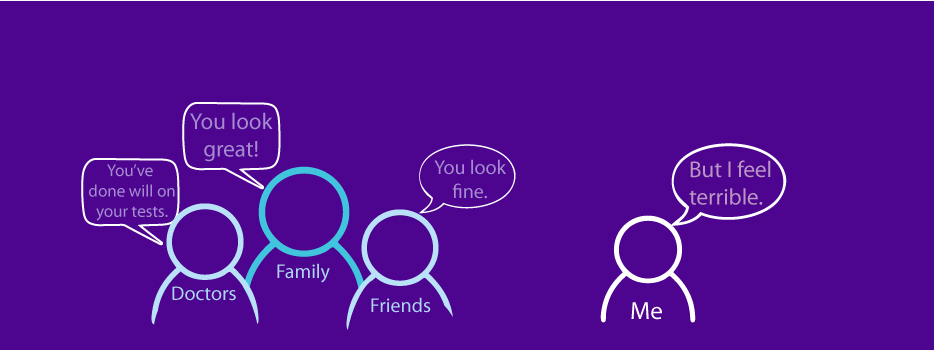My Symptoms Are Worsening, but Everyone Thinks I Look ‘Fine’

“I feel terrible, yet everyone thinks I look fine.” I’ve heard this sentiment expressed many times by folks with Parkinson’s disease.
So, why do we feel so bad?
I was diagnosed with Parkinson’s in 2015, and I am still so frustrated with trying to find relief from my symptoms. Just writing this column has been hard because I feel miserable, which makes it extremely difficult to remain positive.
My quality of life is deteriorating, mainly because of my nonmotor symptoms, which include overwhelming fatigue, speech and swallowing issues, apathy, depression, and a lack of motivation. Overall, I just feel terrible. Words like “weak,” “shaky,” “no self-confidence,” and “vulnerable” come to mind, but they don’t do justice to how horrible I feel.
My motor symptoms consist of bradykinesia, balance issues, and difficulty rolling over in bed. Other than exercise, I have yet to find anything else that can ease my symptoms. Commonly prescribed Parkinson’s medications, such as immediate-release carbidopa/levodopa (C/L), do not appear to provide me much relief from my motor symptoms.
Finding the right combinations and dosages of medications to help me maintain a good quality of life has been a frustrating effort. To make things worse, I feel as though my disease has been progressing quickly over the past year.
‘You look great!’
Everyone, doctors included, says I look great for someone who has had Parkinson’s for more than five years. My movement disorder specialist (MDS) is very frustrated with my case, as she doesn’t know how best to treat me. I am always telling her how awful I feel, and nothing seems to improve my quality of life.
My MDS suggested I add a new medication, Nourianz (istradefylline) to my C/L regimen, which is supposed to reduce my “off times.” My condition seemed to deteriorate even more after I started taking this new medication. My akathisia started to worsen about an hour before my next dose of C/L was scheduled.
I discontinued the Nourianz after about a month. The akathisia episodes, although not considered a side effect of Nourianz, stopped. I then tried Rytary, which replaces C/L, and the akathisia episodes returned with a vengeance. I discontinued Rytary and have now returned to taking my original medication.
Why does the MDS think I am doing well?
I perform well on the standard motor tests the MDS gives me. However, these tests only seem to focus on specific motor skills, and not every movement type that can be impaired due to bradykinesia.
For example, I can still walk at a fast pace, yet it can take me 10 minutes to put my clothes on in the morning. Sometimes, it takes me so long to put on a pair of socks, I exhaust myself and break out in a sweat. Yet, I can perform the finger-tapping, heel-stomping, and toe-tapping motor tests the MDS gives me with relative ease.
Is it all in my head?
At times, I wonder if my worsening symptoms are psychosomatic. Sometimes I feel as if it were all in my head. This is reinforced by everyone telling me I look great for someone with Parkinson’s, although I feel miserable.
In addition to my neurologists, I have also consulted with a naturopathic doctor. She was involved in the creation of an online tool called Patient-Reported Outcomes in Parkinson’s Disease (PRO-PD), a patient-centered, continuous measure of disease severity that correlates with quality of life. I repeat this test every few months.
The naturopath pointed out that my PRO-PD scores started to worsen last May. That is when I had my first elbow surgery, which prohibited me from exercising for several months. I had two more surgeries in December, further impacting my ability to consistently exercise. Add the isolation dictated by COVID-19, and you have a perfect storm. No wonder I feel terrible!
What I know
What is the bottom line? Can I feel as horrible as I do in contrast to what others see? Yes!
The following are reasons why:
- Parkinson’s causes many invisible, nonmotor symptoms that may make a person feel worse than the disease’s motor symptoms do.
- Just because a person with Parkinson’s doesn’t have any visible symptoms does not mean that the symptoms are “all in their head.”
- Exercise is critical to feeling good.
“Things are not always what they seem; the first appearance deceives many.” – Phaedrus
***
Note: Parkinson’s News Today is strictly a news and information website about the disease. It does not provide medical advice, diagnosis or treatment. This content is not intended to be a substitute for professional medical advice, diagnosis, or treatment. Always seek the advice of your physician or another qualified health provider with any questions you may have regarding a medical condition. Never disregard professional medical advice or delay in seeking it because of something you have read on this website. The opinions expressed in this column are not those of Parkinson’s News Today or its parent company, BioNews, and are intended to spark discussion about issues pertaining to Parkinson’s disease.




Comments